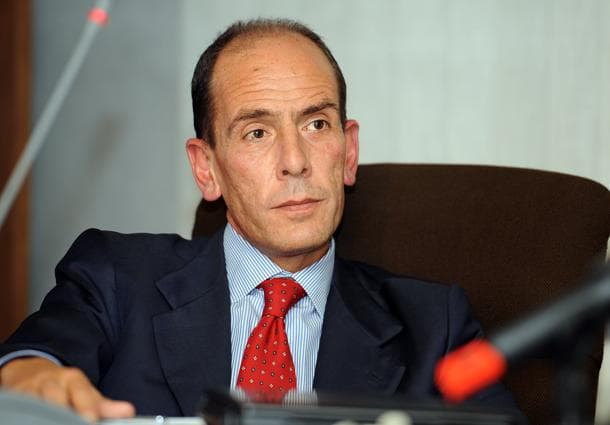ROME – A Vatican court on Saturday sentenced a former official of a papally sponsored children’s hospital to one year of detention, a temporary ban on holding any public office in the Vatican and a fine of a little over $5,000 for using hospital funds to remodel the private apartment of a senior cardinal, with the sentence to be suspended on the condition that he not commit another offense.
Giuseppe Profiti, a former president of Rome’s Bambino Gesù Hospital, was originally accused of embezzlement, but the Vatican court reduced the offense to “abuse of office” after defense attorneys argued the $500,000 outlay to upgrade the Vatican apartment of Italian Cardinal Tarcisio Bertone, the former Secretary of State under Pope emeritus Benedict XVI, was a legitimate business expense.
During the trial, Profiti argued that the upgrades would allow the apartment to be used to host fundraising events for the hospital, and that revenue from those events would easily exceed what the remodeling cost.
Another defendant in the case, former hospital treasurer Massimo Spina, was acquitted on the grounds that he had no authority to approve such expenditures, which the three-judge panel found belonged exclusively to Profiti.
Notably, neither Bertone nor the Italian businessman and longtime Bertone friend, Gianantonio Bandera, whose company was handpicked by Bertone to do the work, were charged in the case.
After retiring in 2013, Bertone was assigned a 400-square-meter (4,305 sq. feet), top-floor apartment in the Vatican-owned Palazzo San Carlo, which sits on the edge of the Vatican gardens and offers fabulous views of St. Peter’s Basilica and overlooks the Vatican hotel where Francis lives.
During the trial, Bertone was shown to have personally engineered the unprecedented maneuver to get an old friend, Gianantonio Bandera, to do the renovation. Bertone’s project jumped the queue for Vatican real estate repairs and avoided the normal external bidding process required for such an expensive overhaul — presumably because he promised to foot the bill himself.
And Bertone did pay some 300,000 euros ($355,000) out of his own pocket. The problem is the hospital foundation also paid Bandera’s firm 422,000 euros for a job that totaled 533,000 euros, including communal repairs to the palazzo’s leaky roof.
In closing arguments Saturday, Profiti lawyer Antonello Blasi insisted there was no crime in using foundation money as an investment since Profiti intended to use Bertone’s apartment for fundraising events to benefit the hospital.
“Investing is not the same thing as spending,” Blasi told the court.
Profiti, for his part, told the court the only reason the operation didn’t return the investment was because the new administration that replaced his had a “new style of fundraising” and didn’t use the apartment.
Prosecutors did not dispute the investment motive for Profiti’s actions.
In the end, Bandera’s firm, Castelli Re, went bankrupt, and the hospital’s 422,000 euros were sent instead to another Bandera company located in Britain, Lg Contractors Ltd.
That was presumably the transaction that tripped up the Vatican’s financial regulators, who were called to testify at trial but declined to provide details, citing the need to keep their intelligence-gathering operations secret.
The only hint of a potential kickback involved a proposed six-figure “donation” from Bandera to the hospital foundation. Profiti said he “didn’t exclude” that he had sought such a donation, and Spina testified that he tried to get the money out of Bandera. Bandera, however, pleaded financial hardship after his company went bankrupt and never paid up.
During the final court hearing on Saturday, Spina’s defense attorney, Alfredo Ottaviani – a great-nephew of the famous Vatican II-era cardinal by that name – also defended Bertone, calling him a “victim” of the case.
Ottaviani noted that Bertone is now 83 years old and that according to Italy’s official census bureau, the average age at death for a male in the country is 83. In that light, he said, most of Bertone’s expenses for the apartment won’t benefit him, but whoever occupies it next.
According to Ottaviani, when Pope Francis assigned Bertone the apartment, he didn’t realize it was basically a “hut … worthy of an Eastern Satrap,” meaning a minor bureaucratic official in the ancient Persian empire, with less than 150 square feet of private space for the cardinal himself.
According to Ottaviani, Bertone was pressured to contribute personal funds to the renovations that were needed, and said very few people could have wielded that kind of influence on a former Vatican Secretary of State – leaving the clear impression that he had Francis in mind.
As for Profiti, his lawyer on Saturday compared him to St. Vincent de Paul, who, said lawyer Antonello Blasi, took money from his benefactors to finance his work for the poor and a century later was declared a saint.
Prosecutors had asked for three years of detention for Profiti and a permanent ban on public office, arguing that a papal hospital “is not a for-profit company and can’t make investments like a company that invests in a bank,” and that “public money used for an investment isn’t just an illicit administrative act but a crime.”
Profiti also argued that fundraising for the hospital went up by 50 percent during his tenure, then dropped after he left.
Although the trial may have given Vatican prosecutors additional information about Bertone’s role in the transaction, there’s no indication that they’re contemplating charges against him, and most observers regard such an outcome as unlikely.
The Associated Press also contributed to this report.














